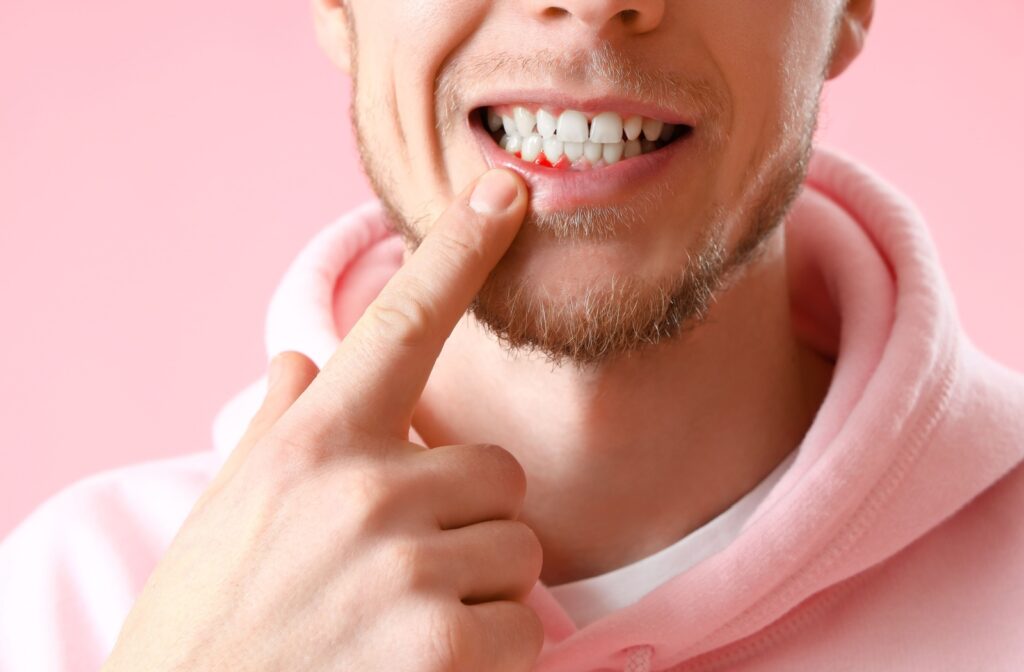Although bleeding gums is far from ideal, it can happen to anyone. However, it does become concerning when the bleeding doesn’t fade.
If your gums continue bleeding, there are methods you can use to soothe them while you wait for your dentist to take a closer look:
- Improve your oral hygiene routine
- Rinse with saltwater solution
- Use antibacterial mouthwash
- Regularly replace your toothbrush
Why Can Your Gums Bleed?
If you’ve been slacking on your oral health, that’s okay. The important thing is that you’re making an effort to get back on track. Your teeth and gums may feel uncomfortable when you brush and floss, but it’s normal for your gums to bleed if you’re new to flossing.
With that said, bleeding gums aren’t ideal. While they can happen to anyone, especially after eating hard foods or brushing too aggressively, persistent bleeding is usually a sign that your gums need a little extra care and attention.
Bleeding gums can stem from several factors, including:
- Plaque and Tartar Buildup: Plaque is a sticky bacterial film that forms on your teeth. If not removed through regular brushing and flossing, it hardens into tartar (which only dental scaling can remove), irritating the gums and causing inflammation known as gingivitis.
- Gingivitis and Gum Disease: Gingivitis, the early stage of gum disease, is often the primary cause of bleeding gums. Left untreated, gingivitis can progress into periodontitis, a more serious condition that can affect the bone supporting your teeth.
- Flossing Too Hard (or Not Enough): If your gums bleed during flossing, this is a sign that you’re not flossing regularly enough or that you’re being too aggressive.
- Medications and Health Conditions: Certain medications, like blood thinners, or conditions such as diabetes, can make gums more prone to bleeding.
If you’re noticing persistent bleeding, let us know! We can uncover the root causes and help you develop a plan to solve the issue.
How to Stop Bleeding Gums
There are a few different steps you can take to stop bleeding gums.
Improve Your Oral Hygiene Routine
Bleeding gums are often linked to inadequate brushing and flossing. Better oral hygiene removes irritants like plaque and bacteria that trigger gum inflammation and bleeding.
Use a soft-bristled toothbrush and remember to brush gently but thoroughly at least twice a day. Do not skip on flossing! Flossing once daily effectively removes plaque and food debris that accumulate in tight areas between the teeth and gums, that the bristles of a toothbrush can’t completely remove.
If you’re new to flossing or don’t do it often, your gums may bleed as your mouth gets used to the overall sensation. Hang in there and simply work through it. If the bleeding continues, it might be time to visit your dentist.
Rinse with a Saltwater Solution
Saltwater creates an inhospitable environment for bacteria, reducing inflammation and soothing irritated gums.
Mix half a teaspoon of salt in warm water and use it as a mouth rinse. This works as a natural disinfectant to reduce swelling and promote healing in your gums. However, saltwater rinse is not a substitute for proper oral hygiene, so make sure to continue with routine brushing and flossing.
Use an Antibacterial Mouthwash
Antibacterial mouthwash reduces harmful microbes, helping your gums heal faster. Choose a mouthwash specifically formulated to target bacteria.
Replace Your Toothbrush Regularly
Over time, toothbrushes can accumulate bacteria. Replace your toothbrush every 3-4 months or when the bristles fray. Fresh bristles on a new toothbrush clean more effectively, reducing bacteria around the gumline and preventing irritation.
Preventing Bleeding Gums
Here are a few ways to keep your gums healthy:
Maintain a Consistent Dental Routine
Try not to slack on your oral hygiene routine. Thoroughly brush for 2 minutes twice a day and floss daily to remove leftover plaque, bacteria, and food debris. Continue with saltwater rinses if your gums feel tender.
If traditional floss isn’t for you, try alternatives! Water flossing and interdental brushes are great if working with dental floss feels challenging.
Eat a Nutritious Diet
A well-rounded diet supports your immune system and oral health, making your gums more resilient. Drinking water throughout the day helps wash away food particles, sugars, and bacteria that can irritate your gums.
Focus on foods rich in Vitamins C and D and antioxidants (think citrus fruits and leafy greens) to strengthen your gums. Other foods like nuts, fish, and lean meats contain essential minerals like calcium and magnesium that help prevent gum inflammation and bleeding.
Avoid excessive sweets or acidic foods that can harm teeth and gums.
Avoid Smoking
Smoking weakens your gum tissue and slows healing.
People who smoke are up to twice as likely to experience gum disease than non-smokers. Nicotine and other harmful substances in cigarettes can increase the amount of tartar buildup and limit blood flow to your gums, leading to gum disease and periodontitis.
Quitting smoking significantly improves gum health and reduces your risk of gum disease. If you need extra support, we’re here to help.
Have Regular Dental Cleanings & Exams
No matter how pristine your oral hygiene routine is, everyone benefits from routine dental exams and cleanings. Professional cleanings target areas your toothbrush and floss can’t effectively clean, reducing gum irritation.
If we detect early signs of gum disease (or another culprit behind bleeding gums), we can often treat them before they become more severe.
Healthy Gums, Confident Smile
Bleeding gums may seem minor, but they can signal something more serious. Taking simple steps to improve your oral hygiene, making small lifestyle changes, and visiting your dentist regularly can stop the bleeding and protect your overall gum health.
If your gums are still bleeding or you’re unsure where to start, Shawnessy Dental Centre is here to help. Book an appointment with our expert team. Let’s work together to get your gums back to perfect health!


